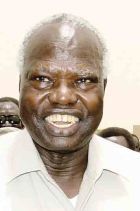Some southern Sudan leaders fear Garang’s monopoly: report
 KHARTOUM, Apr 25, 2005 (Sudan Tribune) — At a time when the Sudan People’s Liberation Movement (SPLM) which is led by John Garang claims that it has surmounted its differences with the rest of the southern factions during the south-south dialogue held in the Kenyan capital under the auspices of the former Kenyan president, Daniel arap Moi, a number of southern politicians have expressed their opposition to Garang’s monopoly of power in the south and their discontent with the outcome of the talks, particularly since most of the armed militias in the south are allied to the Khartoum government and were absent from the talks.
KHARTOUM, Apr 25, 2005 (Sudan Tribune) — At a time when the Sudan People’s Liberation Movement (SPLM) which is led by John Garang claims that it has surmounted its differences with the rest of the southern factions during the south-south dialogue held in the Kenyan capital under the auspices of the former Kenyan president, Daniel arap Moi, a number of southern politicians have expressed their opposition to Garang’s monopoly of power in the south and their discontent with the outcome of the talks, particularly since most of the armed militias in the south are allied to the Khartoum government and were absent from the talks.
The secretary-general of the SPLM, James Wani, told Al-Ittihad newspaper, in the UAE that the conference succeeded in achieving a national reconciliation and accord among southern political parties in Sudan and paved way for true stability in the south in the coming period. Wani further said the most important outcome of the reconciliation conference was the recommendations concerning the militias in the south since the conference called for direct talks between the militias and the SPLM in order to incorporate them into the SPLM army in order to establish peace in the south and evade an outbreak of civil war.
However, a leader with the Democratic Forum for Southern Sudan, Bona Malwal, said the meeting did not go beyond mere slogans and failed to establish a clear mechanism for implementing the resolutions. He pointed out that the absence of southern Sudan armed militias at the meeting was one of the greatest failure. Malwal further said they were not opposed to the SPLM and its leadership, an issue clear to all, however, they were opposed to Garang and his group’s monopoly of all the powers in the south.
He called on southern leaders to continue with dialogue until an acceptable agreement is reached for all, especially issues related to the constitution and decentralization of power, the grating of political and ethnic freedoms, the safeguarding of human rights, reconstruction and sustainable development.
Malwal further said the greatest achievement of the conference was an agreement by all participants to support the peace agreement.
